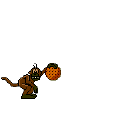 What Is
A Pronoun?
What Is
A Pronoun? What Is
A Pronoun?
What Is
A Pronoun?A pronoun can replace a noun
or another pronoun. You use pronouns like ``he,'' ``which,'' ``none,'' and
``you'' to make your sentences
less cumbersome and less repetitive.
Grammarians classify pronouns into several types,
including the personal pronoun, the demonstrative pronoun, the interrogative
pronoun, the indefinite pronoun, the relative pronoun, the reflexive pronoun,
and the intensive pronoun.
A personal pronoun refers to a specific
person or thing and changes its form to indicate person,
number,
gender,
and case.
A subjective personal pronoun indicates
that the pronoun is acting as the subject
of the sentence. The subjective personal pronouns are ``I,'' ``you,'' ``she,''
``he,'' ``it,'' ``we,'' ``you,'' ``they.''
In the following sentences, each of the highlighted
words is a subjective personal pronoun and acts as the subject of the sentence:
I
was excited when we won the championship tournament.
You
are surely the most athletic child I have ever met.
He
stole Tara’s glove during the game.
When she
was a young woman, she was the best tennis player in her town.
After
many years, they decided to quit playing competitive sports.
We
will meet at the practice field after school.
It
is on the scoreboard.
Are you
the referee from Chicago?
An objective personal pronoun indicates
that the pronoun is acting as an object
of a verb,
compound
verb, preposition,
or infinitive
phrase. The objective personal pronouns are: ``me,'' ``you,'' ``her,''
``him,'' ``it,'' ``us,'' ``you,'' and ``them.''
In the following sentences, each of the highlighted
words is an objective personal pronoun:
Charlie
stole Tara’s glove and forced her be upset with him.
The objective personal pronoun ``her'' is the direct
object of the verb ``forced'' and the objective personal pronoun ``him'' is
the object of the preposition ``with.''
After
catching the ball, Bob threw it into the catcher.
The pronoun ``it'' is the direct object of the
verb ``ball''.
The
agitated coach stood up and faced the angry player and said, ``Our staff will
address you in five minutes.''
In this sentence, the pronoun ``you'' is the
direct object of the verb ``address.''
Deborah
and Roberta will meet us at the football field.
Here the objective personal pronoun ``us'' is the
direct object of the compound verb ``will meet.''
Give
the scores to me.
Here the objective personal pronoun ``me'' is the
object of the preposition ``to''.
I'm
not sure that my opponent will talk to you.
Similarly in this example, the objective personal
pronoun ``you'' is the object of the preposition ``to''.
Christopher
was surprised to see her at the drag races.
Here the objective personal pronoun ``her'' is
the object of the infinitive phrase ``to see.''
A possessive pronoun indicates that the
pronoun is acting as a marker of possession and defines who owns a particular
object or person. The possessive personal pronouns are ``mine,''
``yours,'' ``hers,'' ``his,'' ``its,'' ``ours,'' and ``theirs.'' Note that
possessive personal pronouns are very similar to possessive
adjectives like ``my,'' ``her,'' and ``their.''
In each of the following sentences, the highlighted
word is a possessive personal pronoun:
The
smallest puck is mine.
Here the possessive pronoun ``mine'' functions as
a subject
complement.
This
is yours.
Here too the possessive pronoun ``yours''
functions as a subject complement.
His is
on the bench.
In this example, the possessive pronoun ``his''
acts as the subject of the sentence.
Theirs
will be tallied tomorrow.
In this sentence, the possessive pronoun
``theirs'' is the subject of the sentence.
Ours
has the number one on it.
Here too the possessive pronoun ``ours'' function
as the subject of the sentence.
A demonstrative pronoun points to and
identifies a noun or a pronoun. ``This'' and ``these'' refer to things that are
nearby either in space or in time, while ``that'' and ``those'' refer to things
that are farther away in space or time.
The demonstrative pronouns are ``this,''
``that,'' ``these,'' and ``those.'' ``This'' and ``that'' are used to refer to singular
nouns or noun
phrases and ``these'' and ``those'' are used to refer to plural
nouns and noun phrases. Note that the demonstrative pronouns are identical to demonstrative
adjectives, though, obviously, you use them differently. It is also
important to note that ``that'' can also be used as a relative pronoun.
In the following sentences, each of the highlighted
words is a demonstrative pronoun:
This
must not continue.
Here ``this'' is used as the subject of the
compound verb ``must not continue.''
This
is puny; that is the bowling ball I want.
In this example ``this'' is used as subject and
refers to something close to the speaker. The demonstrative pronoun ``that'' is
also a subject but refers to something farther away from the speaker.
Three
players wanted these.
Here ``these'' is the direct object of the verb
``wanted''.
An interrogative pronoun is used to ask
questions. The interrogative pronouns are ``who,'' ``whom,'' ``which,'' ``what''
and the compounds formed with the suffix
``ever'' (``whoever,'' ``whomever,'' ``whichever,'' and ``whatever''). Note that
either ``which'' or ``what'' can also be used as an interrogative
adjective, and that ``who,'' ``whom,'' or ``which'' can also be used as a
relative pronoun.
You will find ``who,'' ``whom,'' and occasionally
``which'' used to refer to people, and ``which'' and ``what'' used to refer to
things and to animals.
``Who'' acts as the subject of a verb, while
``whom'' acts as the object of a verb, preposition, or a verbal.
The highlighted word in each of the
following sentences is an interrogative pronoun:
Which
wants to run the race first?
``Which'' is the subject of the sentence.
Who
threw the disc the furthest??
Similarly ``who'' is the subject of the sentence.
Whom
do you think we should vote MVP?
In this sentence, ``whom'' is the object of the
verb ``vote.''
To whom
do you wish to speak?
Here the interrogative pronoun ``whom '' is the
object of the preposition ``to.''
Who
will meet the team at the train station?
In this sentence, the interrogative pronoun
``who'' is the subject of the compound verb ``will meet''.
To whom
did you give the statistics?
In this example the interrogative pronoun
``whom'' is the object of the preposition ``to.''
What
did she say?
Here the interrogative pronoun ``what'' is the
direct object of the verb ``say.''
You can use a relative pronoun is used to
link one phrase
or clause
to another phrase or clause. The relative pronouns are ``who,'' ``whom,''
``that,'' and ``which.'' The compounds ``whoever,'' ``whomever,'' and
``whichever'' are also relative pronouns.
You can use the relative pronouns ``who'' and
``whoever'' to refer to the subject of a clause or sentence, and ``whom'' and
``whomever'' to refer to the objects of a verb, a verbal or a preposition.
In each of the following sentences, the highlighted
word is a relative pronoun.
You
may invite whomever you like to the game.
The relative pronoun ``whomever'' is the direct
object of the compound verb ``may invite''.
The
player who wins the greatest popular vote is not always awarded.
In this sentence, the relative pronoun is the
subject of the verb ``wins'' and introduces the subordinate
clause ``who wins the greatest popular vote''. This subordinate clause acts
as an adjective
modifying ``player.''
In a
time of crisis, the coach asks the players whom she believes to be the
most efficient to arrive an hour earlier than usual.
In this sentence ``whom'' is the direct object of
the verb ``believes'' and introduces the subordinate clause ``whom she believes
to be the most efficient''. This subordinate clause modifies the noun
``players.''
Whoever
broke the basketball net will have to replace it.
Here ``whoever'' functions as the subject of the
verb ``broke''.
The
racquet, which was left on the court, has now been moved into the storage
closet.
In this example ``which'' acts as the subject of
the compound verb ``was left'' and introduces the subordinate clause ``which was
left on the court.'' The subordinate clause acts as an adjective modifying the
noun ``racquet.''
I will
read whichever list arrives first.
Here ``whichever'' modifies the noun ``list'' and
introduces the subordinate clause ``whichever list arrives first.'' The
subordinate clause functions as the direct object of the compound verb ``will
read.''
An indefinite pronoun is a pronoun
referring to an identifiable but not specified person or thing. An indefinite
pronoun conveys the idea of all, any, none, or some.
The most common indefinite pronouns are ``all,''
``another,'' ``any,'' ``anybody,'' ``anyone,'' ``anything,'' ``each,''
``everybody,'' ``everyone,'' ``everything,'' ``few,'' ``many,'' ``nobody,''
``none,'' ``one,'' ``several,'' ``some,'' ``somebody,'' and ``someone.'' Note
that some indefinite pronouns can also be used as indefinite
adjectives.
The highlighted words in the following
sentences are indefinite pronouns:
Many
were invited to the meet but only twelve showed up.
Here ``many'' acts as the subject of the compound
verb ``were invited''.
The
locker room had been searched and everything was thrown onto the floor.
In this example, ``everything'' acts as a subject
of the compound verb ``was thrown.''
We
donated everything we found in the box to the younger hockey team.
In this sentence, ``everything'' is the direct
object of the verb ``donated.''
Although
they looked everywhere for extra copies of the roster, they found none.
Here too the indefinite pronoun functions as a
direct object: ``none'' is the direct object of ``found.''
Make
sure you give everyone a copy of the lineup.
In this example, ``everyone'' is the indirect
object of the verb ``give'' -- the direct object is the noun phrase ``a copy
of the lineup.''
Give a
registration package to each.
Here ``each'' is the object of the preposition
``to.''
You can use a reflexive pronoun to refer
back to the subject of the clause or sentence.
The reflexive pronouns are ``myself,''
``yourself,'' ``herself,'' ``himself,'' ``itself,'' ``ourselves,''
``yourselves,'' and ``themselves.'' Note each of these can also act as an
intensive pronoun.
Each of the highlighted words in the
following sentences is a reflexive pronoun:
Athletes
give themselves plenty of rest before a game.
The
coach often does the recruiting herself.
After
the game, I asked myself why I got so upset.
Richard
usually remembered to send a copy of his e-mail to himself.
Although
the men promised to mow the field, we ended up doing it ourselves.
An intensive pronoun is a pronoun used to
emphasise its antecedent.
Intensive pronouns are identical in form to reflexive pronouns.
The highlighted words in the following
sentences are intensive pronouns:
I myself
believe that we are going to win the swim competition.
The
head official himself said that it was a technical foul.
They themselves promised to come to the game even though they had a final exam at the same time.
